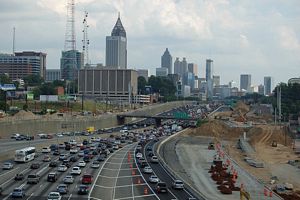|
By accessing or using The Crittenden Automotive Library™/CarsAndRacingStuff.com, you signify your agreement with the Terms of Use on our Legal Information page. Our Privacy Policy is also available there. |

Noise Pollution Takes Toll On Health
|
|---|
|
|
Noise Pollution Takes Toll On Health
Voice of America
September 11, 2012
 Rush hour in Atlanta, Georgia (Photo: Matt Lemmon via Flickr/Creative Commons) Rush hour in Atlanta, Georgia (Photo: Matt Lemmon via Flickr/Creative Commons)
|
Traffic noise can be hazardous to your health, according to the results of a study published in the American Journal of Preventive Medicine.
Researchers studied noise pollution in Fulton County, Georgia. Their findings suggest many of the community’s residents are exposed to high levels of noise from local road traffic which affects their psychological well being and can disturb their sleep, both of which can have serious health consequences.
Last year, the World Health Organization (WHO) also weighed in on the health hazards of environmental noise, saying it can cause adverse psychosocial and physiological effects on public health. WHO research in Western Europe showed that traffic-related noise was responsible for taking more than one million healthy years of life per year because of ill health, disability or early death.
Fulton County, where the study took place, is an urban area which includes the city of Atlanta and its surrounding suburbs. Like most large American cities, Fulton County is surrounded and crisscrossed with a network of major roadways and interstate highways carrying thousands of motorists each day.
The study focused on Interstate Highway 285, a large highway loop that encircles Atlanta, running around the heart of the county.
Researchers collected data from various points to get an estimate of road traffic noise exposure levels surrounding I-285. This included specific physical and characteristics of the area, the level of vehicle traffic and speed, and the various types of vehicles that traveled the interstate.
Guided by the US Federal Highway Administration’s Traffic Noise Model, researchers created traffic noise maps of their study area for both day and night. They then examined and measured various parameters to determine the possibilities that certain percentages of the populace, who are exposed to varying levels of road traffic noise, would be become highly annoyed or have high levels of sleep disturbance, at any given time.
The small city of College Park, Georgia, about ten miles southwest of Atlanta and surrounded with highways, came in first with the highest percentage of its population being at risk of being most affected by noise pollution. About 11.3 percent of College Park’s daytime population and 3.7 percent of its nighttime population were estimated to be at risk for experiencing either annoyance or sleep disturbance.
Ironically, US Census Bureau data indicates that the greater Atlanta area had the lowest number of households – from among 38 metropolitan areas – reporting the presence of road traffic noise.
“It may be assumed that even more people would be affected in other densely populated areas of the US,” says the study’s co-investigator James Holt, of the U.S. Centers of Disease Control in Atlanta.


















 Rush hour in Atlanta, Georgia (Photo: Matt Lemmon via Flickr/Creative Commons)
Rush hour in Atlanta, Georgia (Photo: Matt Lemmon via Flickr/Creative Commons)
